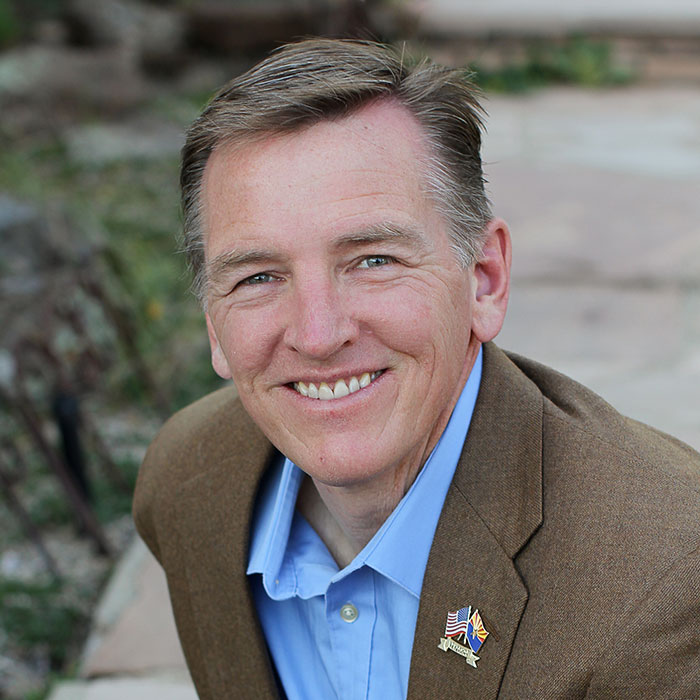|
Washington, D.C. October 11, 2017 -Today, U.S. Congressman Paul A. Gosar, D.D.S. (AZ-04) released the following statement after a House Committee on Natural Resources legislative hearing on H.R. 2630, which would authorize the Secretary of the Interior to convey Bureau of Land Management (BLM) land to La Paz County, Arizona, to create economic development opportunities and facilitate renewable electricity generation for the Western United States:
“This bipartisan legislation is a remarkable opportunity to put Arizona’s best asset, sunshine, to work. Solar energy generation in La Paz County will provide clean renewable power for the Southwestern United States as well as create high paying jobs and economic development for this rural corner of Arizona. Many are unaware of the burdensome federal land issues Western counties face,” said Rep. Gosar, “but I am here to advocate for the citizens of La Paz County and am happy to serve as an ally for American energy opportunity.”
“I am pleased that a county which currently has only six percent of its land available for taxable economic use is about to see new opportunities, increased employment and energy innovation. This bill will allow the County to purchase approximately 8,000 acres from the BLM at fair market value to use for solar energy development. This means a return to economic opportunity and prosperity for the hard-working citizens of La Paz County. I commend Chairman Wilson, the County Board of Supervisors and the broad stakeholders for assisting in the creation of this commonsense bill that signals a commitment to sustainable energy and innovation in Arizona.”
“I’d like to thank Congressman Gosar for spearheading the La Paz County Land Conveyance Act, which would finally allow us to put more of our land to good use,” stated La Paz County Supervisor and Chairman of the Board D.L. Wilson. “Far from simply accepting the challenges of the immense federal footprint in our community, we are creating new opportunities to take full advantage of the unique assets of our County. The work we are doing with this bill will have direct positive impact on the lives of La Paz residents by creating good paying jobs and providing much-needed revenue for important county services.”
Background:
The full text of H.R. 2630 can be found HERE.
Cosponsors of the bill include Rep. Andy Biggs (AZ-05), Rep. Trent Franks (AZ-08) and Rep. Kyrsten Sinema (AZ-09).
The BLM-prepared map depicting the site of the proposed land conveyance can be found HERE.
Senator Jeff Flake (R-AZ) introduced companion legislation in the U.S. Senate.
La Paz County, Arizona, is a small county in Southwestern Arizona defined by the Colorado River, vast Arizona desert, and a massive federal footprint. H.R. 2630 is a cooperative effort with the La Paz County Supervisors to help facilitate a land transfer from Bureau of Land Management to the County. Because of the limited private land available in the County, a sale of federal land to the County is necessary to provide enough space for this type of development. This transfer would allow the County to purchase land at fair-market value from the BLM, which they can use to pursue utility-scale sustainable solar energy production with private developers.
After acquiring the approximately 8,000 acres from BLM, the La Paz County Board of Supervisors intend to create long-term lease contracts with renewable energy project developers. This effort responds to national demand to increase renewable power generation while also helping to create new sources of revenue to address the economic challenges inherent to a jurisdiction with almost 95% of the County’s property owned by federal, state or tribal governments.
There are many precedent-setting examples of other Western counties using legislation to seek the conveyance of federal lands to stimulate economic development in rural locations. La Paz County proposes to use a similar process to acquire a large parcel of property that could interconnect with the “Ten West Link” currently proposed to transect La Paz County.
The previous press release announcing the introduction of H.R. 2630 on May 24, 2017 can be found HERE.
|
 Congressman
Paul Gosar D.D.S.
Proudly Serving Arizona's 9th Congressional District
Congressman
Paul Gosar D.D.S.
Proudly Serving Arizona's 9th Congressional District